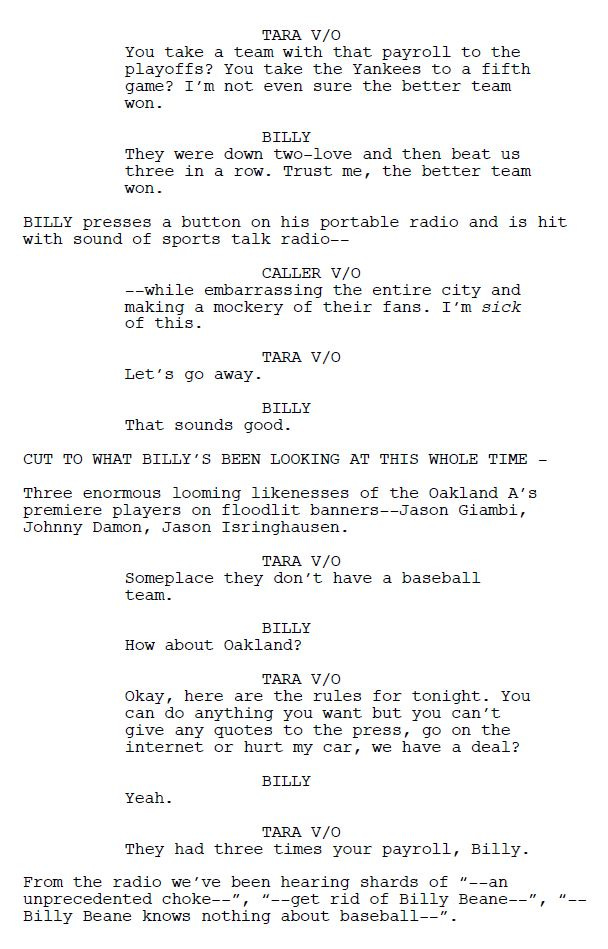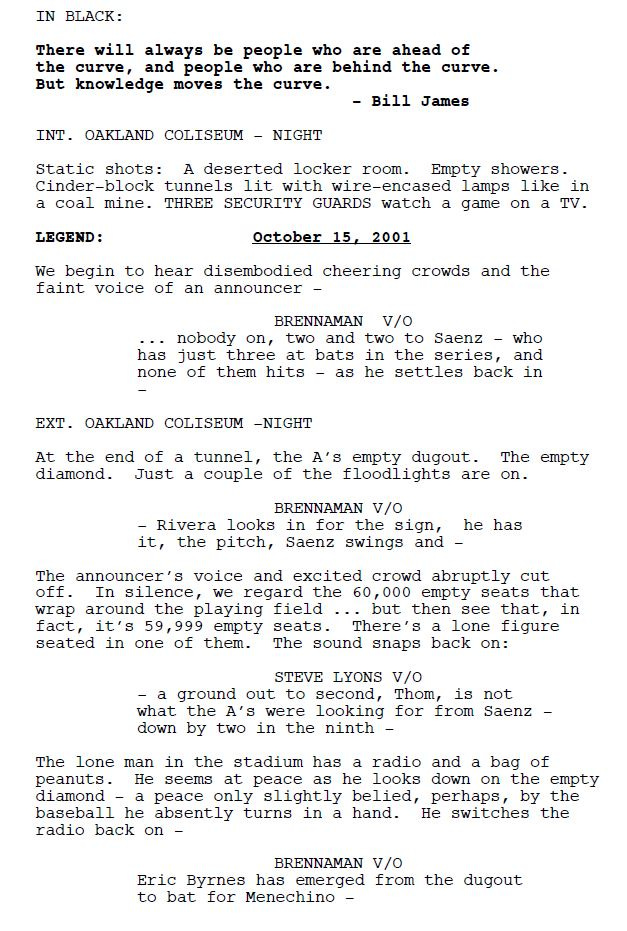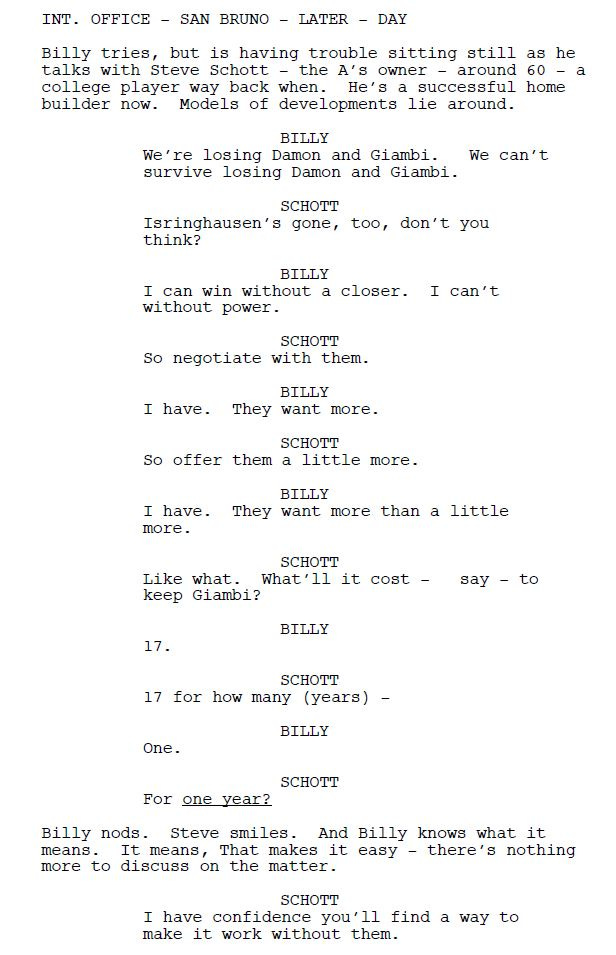Moneyball (2011) Script Review | #56 WGA 101 Greatest Scripts of the 21st Century
An atypical sports drama that finds the human story underneath the jargon of sabermetrics that changed baseball forever.
Logline: Limited by a tight budget, Oakland Athletics general manager Billy Beane partners with a young Yale economics graduate to assemble an unlikely winning team by using a novel strategy of a computer-generated analysis to draft players.
Written by: Steven Zaillian and Aaron Sorkin
Story by: Stan Chernin
Based on: Moneyball by Michael Lewis
Pages: 166
Moneyball is one of two ambitious adaptations of Michael Lewis’s works that appear on the WGA’s list of 101 Greatest Screenplays of the 21st Century (the other is The Big Short at #55), and its inclusion here is for good reason: the screenplay serves as a prime example of how to take a book about statistics and other technical knowledge, and turn it into an intriguing underdog story.
The statistics and technical knowledge referred to here is baseball. Or rather, it forms the setting for the based-on-a-true-story exploits of one baseball manager who used sabermetrics to assemble a winning team for the Oakland Athletics, and consequently prove that the collective wisdom of baseball insiders was faulty. Yes, there is plenty of sports jargon tossed around in here, but it does not leave a non-baseball fan feeling flummoxed about what they are talking about.
It is 2001, and the Oakland Athletics have suffered a crushing defeat in the Division Series. General Manager Billy Beane is tasked with turning the team around, but he doesn’t have the budget to buy the best players at a high price. But what he can do is try to identify potentially great players undervalued by everybody else, and poach them for pennies. Finding a kindred spirit in Peter Brand (based on Paul DePodesta), Beane teams up with the baseball-loving economics major to implement his ideas. Naturally, not everybody is happy, especially coach Art Howe, and Beane has to push back.
What follows is an atypical sports story that eschews the template of other sports movies, like say, Rocky. In Moneyball, the underdogs slowly but steadily claw their way to the top despite obstacles, but a lot of the victories take place off-screen. Instead, the focus is kept on Beane and Brand. This is partly due to budgetary reasons, as well as director Bennett Miller’s intentions to subvert the sports movie genre. The results speak for themselves. It is clever, assured, and most importantly, it is not dull.
[INSERT]
Moneyball clocks in at a whopping 166 pages, but that’s because swathes of pages are devoted to sharply written, often acerbic dialogue.
While the screenplay takes a linear approach, there are also flashbacks included that cover Beane’s own failed ambitions to become a big-league baseball player and why he transitioned to becoming a general manager instead. The flashbacks add thematic heft because it allows us to empathize with Beane and what it feels like to be on the losing end. When he supports players like Scott Hatteberg, David Justice, and Chad Bradford, there is a tangible sense that his belief in their potential comes from a personal place.
The script also takes time to focus on Beane’s relationship with his daughter Casey; while there are scenes that were written and shot featuring Tara, Beane’s second wife, they were cut from the film. These moments serve as the B-plot of the screenplay, deepening Beane’s character.
The subplot with Casey appears to be Stan Chervin’s contribution to the final screenplay, who admits that he made it up to parallel Beane’s professional failure-to-success arc. In an interview, Chervin said, “For me, when you’re dramatizing a true story, the focus has to be more on the moral truth — the emotional truth — rather than the literal truth.” He was onto something: before the script ends with the expected title cards announcing the fates of the main characters, it concludes with a scene of father listening to a song played by his daughter. Sometimes, the best stories about sports aren’t about the sport at all; it’s about the people in it.
Moneyball is a unique beast of a screenplay. It is perhaps the exception to the rule where multiple writers dilute a script’s strength; here, it actually benefits from three different voices. Chervin wrote several drafts between 2004 and 2007, before Steven Zaillian (Schindler’s List) took over circa 2008. It was supposed to film in July 2009 under Steven Soderbergh’s direction before it was canceled five days prior to the starting date, at which point the project entered ‘limited turnaround.’ Miraculously, it was revived, and Aaron Sorkin (The Social Network) was hired for rewrites. Zaillian and Sorkin share the bulk of the writing credits (with Chervin handed a ‘Story by’ credit) and their writing styles could not be more different. Zaillian has a gift for writing stories that veer into dark places; Sorkin has a gift for memorable dialogue. But instead of turning into a grotesque Frankenstein’s monster of mismatched tones, their combined strengths bring together something entirely different in both writers’ oeuvres. Zaillian’s strength is in writing a “heavier, earthier, more internal, brooding, darker perspective”; apart from his dialogue, Sorkin can write “comedic haiku that communicates volumes in a moment, in a beat.” Miller sums it up succinctly: “Zaillian wrote more to the internal, beneath the surface, and Sorkin managed to write very effectively for the more public, charismatic side of Billy.”
Another:
However, neither of them worked together on the script. Sorkin, who accepted the offer only after he got Zaillian’s approval, honored the latter’s request to “write more” of what was written instead of changing the movie. Each of them would write different bits and pieces independently, and Miller would stitch the separate pages together to create a cohesive whole.
Just as it takes a village to raise a child, it takes a team to bring a screenplay together. Brad Pitt, who’d go on to star as Billy Beane, pushed the studio and producers to lean into the “deeper meaning within the book” and focus on what he thought was “a value system that was out of whack.” Resisting the more commercial and comedic angle Chervin’s early drafts took, Pitt became more enthusiastic when Zaillian’s new draft gave him the character he sought, one that was “verbose, competitive and sharp.” Producer Scott Rudin helped Miller oversee the script work as the pages flew back-and-forth, a situation that could have ended in failure under less experienced hands. Mercifully, it helped that everyone was attuned to the same goal, allowing them to converge onto Miller’s vision.
With Pitt’s backing, Moneyball turned into a rare work commissioned by a studio that is entertaining yet has something different to offer along the way. The screenplay is a Trojan horse smuggling an unconventional story in something that looks like, but isn’t, a sports movie. It is a miracle screenplay, resurrected like Lazarus, and blessed with prodigious talent. Intelligent, and held together by rounded characters, it is devoid of the melodrama and cliches normally associated with the sports genre. It may be a long time before we read a script like Moneyball ever again.
Notes:
Belloni, Matthew; Galloway, Stephen (21 November, 2011) | THR’s Writer Roundtable: 6 Top Scribes Talk Standing Up to Clint Eastwood, Dealing with Rewrites and Being Fired by Your Wife | (The Hollywood Reporter)
Block, Alex B. (16 December, 2011) | Brad Pitt Reveals What He, Sony Did to Save ‘Moneyball’ (The Hollywood Reporter)
Myers, Scott (14 October 2011) | More background on the screenplay development of “Moneyball” (Go Into The Story)
Thompson, Anne (26 September, 2011) | How Did Moneyball Director Bennett Miller Make a Smart Studio Movie? Brad Pitt. (Indiewire)







